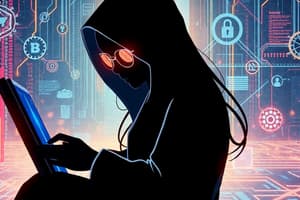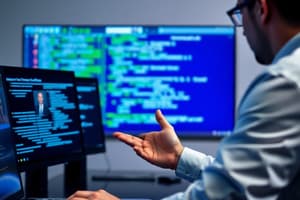Podcast
Questions and Answers
In computer ethics, ensuring the security of data and systems against vulnerabilities and malicious attacks falls under the ethical concern of security and ______.
In computer ethics, ensuring the security of data and systems against vulnerabilities and malicious attacks falls under the ethical concern of security and ______.
reliability
The ethical principle of ______ in computer professionalism involves safeguarding personal data and ensuring users' privacy is protected in every interaction.
The ethical principle of ______ in computer professionalism involves safeguarding personal data and ensuring users' privacy is protected in every interaction.
privacy
The concept referring to the gap between individuals who have access to modern information and communication technology and those who do not is known as the ______ ______.
The concept referring to the gap between individuals who have access to modern information and communication technology and those who do not is known as the ______ ______.
digital divide
Treating all colleagues with respect, fairness, and courtesy, fostering an environment of collaboration and mutual support, aligns with the ethical principle of respect for ______.
Treating all colleagues with respect, fairness, and courtesy, fostering an environment of collaboration and mutual support, aligns with the ethical principle of respect for ______.
Adhering to relevant laws, regulations, and industry standards is crucial for ICT professionals to ensure ______ and avoid legal pitfalls.
Adhering to relevant laws, regulations, and industry standards is crucial for ICT professionals to ensure ______ and avoid legal pitfalls.
When misinformation and fake news spread through ICT platforms, ensuring the accuracy and ______ of information becomes a key ethical responsibility.
When misinformation and fake news spread through ICT platforms, ensuring the accuracy and ______ of information becomes a key ethical responsibility.
To uphold ethical standards, computer professionals should acknowledge and respect the creations and inventions of others, especially concerning ______ ______.
To uphold ethical standards, computer professionals should acknowledge and respect the creations and inventions of others, especially concerning ______ ______.
ICT professionals can enhance their ______ reputation by acting ethically, which is essential for career advancement and long-term success.
ICT professionals can enhance their ______ reputation by acting ethically, which is essential for career advancement and long-term success.
The General Data Protection Regulation, commonly referred to as ______, is a privacy law in Europe.
The General Data Protection Regulation, commonly referred to as ______, is a privacy law in Europe.
A computer crime involves any illegal activity related to computers or networks, including offenses like hacking, identity theft, and distributing ______.
A computer crime involves any illegal activity related to computers or networks, including offenses like hacking, identity theft, and distributing ______.
The principle of ______ requires professionals to be honest and trustworthy, ensuring accuracy and reliability while refraining from deceitful practices.
The principle of ______ requires professionals to be honest and trustworthy, ensuring accuracy and reliability while refraining from deceitful practices.
When unauthorized access to personal data occurs or surveillance is conducted without consent, it constitutes a ______ violation.
When unauthorized access to personal data occurs or surveillance is conducted without consent, it constitutes a ______ violation.
Addressing threats like hacking, malware, and phishing requires ICT professionals to protect systems and stay updated on the latest ______ trends.
Addressing threats like hacking, malware, and phishing requires ICT professionals to protect systems and stay updated on the latest ______ trends.
The ethical principle of ______ requires impartial and objective decisions, ensuring all stakeholders are treated justly, in order to promote fairness.
The ethical principle of ______ requires impartial and objective decisions, ensuring all stakeholders are treated justly, in order to promote fairness.
Exploiting vulnerabilities for personal gain, financial profit, or causing harm is characteristic of ______ hacking.
Exploiting vulnerabilities for personal gain, financial profit, or causing harm is characteristic of ______ hacking.
Ensuring employment contracts and service agreements are clearly defined and legally enforceable falls under the scope of ______ law.
Ensuring employment contracts and service agreements are clearly defined and legally enforceable falls under the scope of ______ law.
Acknowledging and respecting intellectual property rights aims to ensure there is no unauthorized use of others' ______.
Acknowledging and respecting intellectual property rights aims to ensure there is no unauthorized use of others' ______.
The professional development of ICT professionals is achieved by mentoring others and ______ knowledge, and participating in professional activities.
The professional development of ICT professionals is achieved by mentoring others and ______ knowledge, and participating in professional activities.
Cyberbullying and online harassment, often enabled by ICT anonymity, can occur, thereby creating unethical behaviors or unsafe, disrespectul online ______.
Cyberbullying and online harassment, often enabled by ICT anonymity, can occur, thereby creating unethical behaviors or unsafe, disrespectul online ______.
According to ethical principles in ICT, professionals should act in the best interests of the public, ensuring public ______, health, and welfare are paramount.
According to ethical principles in ICT, professionals should act in the best interests of the public, ensuring public ______, health, and welfare are paramount.
Flashcards
Respect for Privacy
Respect for Privacy
Safeguarding personal data and ensuring users' privacy. Collect, store, and use personal information only for legitimate purposes with consent.
Integrity
Integrity
Being honest and trustworthy in actions. Ensuring accuracy, reliability, and refraining from deceitful practices.
Responsibility
Responsibility
Being accountable for the consequences of one's actions and striving to minimize any negative impacts on users, society, and the environment.
Fairness
Fairness
Signup and view all the flashcards
Respect for Intellectual Property
Respect for Intellectual Property
Signup and view all the flashcards
Computer Crime
Computer Crime
Signup and view all the flashcards
Public Interest
Public Interest
Signup and view all the flashcards
Quality of Life
Quality of Life
Signup and view all the flashcards
Competence
Competence
Signup and view all the flashcards
Property Rights
Property Rights
Signup and view all the flashcards
Contract Law
Contract Law
Signup and view all the flashcards
Intellectual Property Law
Intellectual Property Law
Signup and view all the flashcards
Privacy Law
Privacy Law
Signup and view all the flashcards
Labor Law
Labor Law
Signup and view all the flashcards
Privacy Violations
Privacy Violations
Signup and view all the flashcards
Data Security
Data Security
Signup and view all the flashcards
Intellectual Property Theft
Intellectual Property Theft
Signup and view all the flashcards
Ethical Hacking
Ethical Hacking
Signup and view all the flashcards
Malicious Hacking
Malicious Hacking
Signup and view all the flashcards
Digital Divide
Digital Divide
Signup and view all the flashcards
Study Notes
Ethical Principles for Computer Professionals
- Respect for privacy is about safeguarding personal data and ensuring user privacy
- Professionals should only collect, store, and use personal data for legitimate purposes with consent
- Integrity requires honesty and trustworthiness, ensuring accuracy/reliability, and avoiding deceit
- Responsibility means being accountable for actions, understanding the impact on users/society/environment, and minimizing negative effects
- Fairness involves treating everyone equally and without discrimination, making impartial/objective decisions
- Respect for intellectual property means acknowledging others' creations, avoiding plagiarism, unauthorized copying, and misuse
Major Ethical and Moral Issues in Information Systems
- Privacy issues arise from vast amounts of personal data collected/stored, raising concerns about access, usage, and protection
- Security concerns grow with increased reliance on information systems, leading to cyber-attacks and data breaches.
- The digital divide is the gap between those with and without access to modern technology, causing inequality.
Meaning of Computer Crime
- Computer crime is any illegal activity involving a computer or network.
- Such crimes include hacking, identity theft, malware distribution, cyberstalking, online fraud, and unauthorized access.
- Computer crimes exploit digital information and technology to commit offenses
Fundamental Principles of Ethics and Professional Practice
- Professionals should act in the public interest by ensuring public safety, health, and welfare
- Strive to improve life quality by developing and applying technology responsibly
- Honesty requires transparency and truthfulness in all professional relationships
- Competence requires continuous learning and staying updated with technology
- Contribute to professional development by mentoring, sharing knowledge, and participating activities
- Treat colleagues respectfully and foster collaboration/support
- Acknowledge intellectual property rights and avoid plagiarism/unauthorized use
- Accountability means accepting responsibility and justifying actions
Types of Law Promoting Professional Ethics
- Contract law governs agreements, ensuring defined and enforceable terms, including employment/service/nondisclosure agreements
- Intellectual property law protects creators' rights through copyrights, patents, and trademarks
- Privacy law regulates personal data collection/storage/use, protecting privacy rights
- GDPR (Europe) and HIPAA (US) are examples of privacy law
- Labor law ensures fair employee treatment with standards for working conditions/wages/benefits, including anti-discrimination, and health & safety
Importance of Ethics in ICT
- Ethical practices build trust among users, clients, and stakeholders, enhancing credibility
- Ethical considerations protect user privacy and data, preventing data breaches and misuse
- Ethical behavior promotes secure and reliable systems, protecting against vulnerabilities and attacks
- Ethics aligns with legal requirements, helping avoid legal pitfalls and consequences like data breaches or IP violations
- Ethical practices promote fairness/equality in technology access, addressing the digital divide
- Ethical ICT professionals maintain a good reputation, crucial for career advancement
Common Ethical Issues in ICT
- Privacy violations include unauthorized access to personal data and surveillance without consent
- Data security requires protecting against breaches, hacks, and unauthorized access through robust measures and continuous updates
- Intellectual property theft includes plagiarism, software piracy, and unauthorized use of copyrighted material
- The digital divide is the disparity in technology access across socio-economic groups raising equality questions
- Cyberbullying and harassment stem from anonymity, requiring safe and respectful online environments
- Misinformation and fake news spread through ICT platforms, reliability of information is a key responsibility for ICT professionals.
Ethical Hacking vs. Malicious Hacking: Intent and Purpose
- Ethical hacking aims to identify/fix vulnerabilities in systems/networks/applications.
- Organizations hire ethical hackers to improve security.
- Malicious hacking exploits vulnerabilities for personal/financial gain or harm.
- This type of hacking is illegal.
Ethical Hacking vs. Malicious Hacking: Authorization
- Ethical hackers have permission from system owners for security tests within legal agreements.
- Malicious hackers lack permission/authorization to access or exploit systems; their activities are unauthorized/illegal.
Ethical Hacking vs. Malicious Hacking: Outcome and Impact
- Ethical hacking has positive outcomes, enhancing system security and leading to corrective actions
- Malicious hacking has negative impacts, including data theft, financial loss, system damage, stolen data may be used illegal activities.
Ethical Hacking vs. Malicious Hacking: Methods and Tools
- Ethical hackers use similar tools as malicious hackers but in a controlled/legal manner.
- Their goal is to find/fix vulnerabilities proactively.
- Malicious hackers bypass security measures with malware, phishing, and deception for unauthorized access.
Process Steps of Ethical Analysis
- Identify the ethical issue by clearly defining the dilemma
- Gather relevant information: facts, stakeholders, consequences, laws, guidelines
- Consider ethical principles: integrity, fairness, responsibility, privacy
- Identify stakeholders affected by the issue
- Evaluate options based on ethical implications: benefits, risks, fairness
- Make a decision aligned with ethical principles, minimizing harm, maximizing benefits
- Implement chosen action effectively and transparently
- Reflect and review the outcomes/process for future improvements
IT Ethical Challenges for ICT Professionals
- Data privacy and protection requires ensuring data confidentiality, integrity, and availability, and security measures
- Cybersecurity threats, Professionals need to address hacking, malware, phishing by staying updated
- Protecting Intellectual property rights is key, avoid plagiarism and unauthorized use
- Address the Digital divide: Bridge the gap in access to modern tech, accessible, and affordable
- Combat misinformation Professionals ensure accuracy and reliability
- Ethical use of AI: Use AI ethically by addressing bias/employment impact
- Workplace surveillance requires clear policies for security/monitoring while respecting privacy
- Environmental impact: Minimize footprint by promoting sustainable practices like efficient data centers
- Professional conduct maintains honesty in all professional activities
- Comply with laws stay informed and adhere to standards
Studying That Suits You
Use AI to generate personalized quizzes and flashcards to suit your learning preferences.




